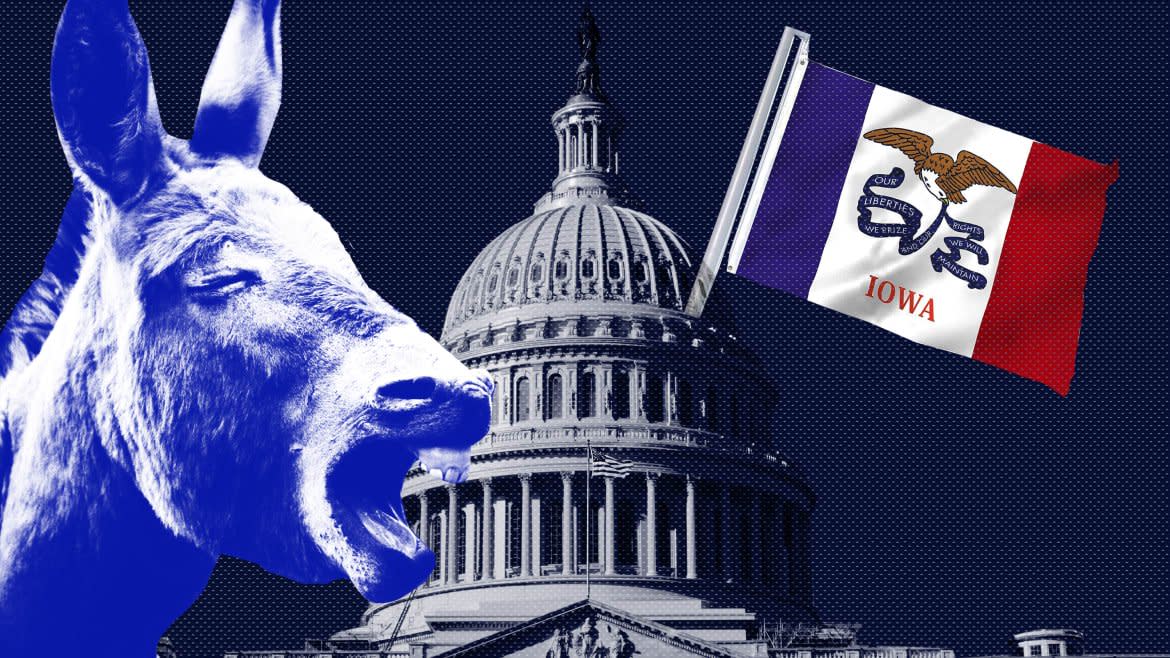Iowa Dems Furious With DNC for Killing Virtual Caucus Plan

Five months before the first caucus meets, the different factions of the Iowa Democratic Party have come together and it’s all thanks to the Democratic National Committee.
“All of Iowa is angry today,” Sean Bagniewski, the chair of the Polk County Democrats, told The Daily Beast. “This is one time the entire Iowa Democratic Party has been united on anything. And it’s in anger at the DNC.”
An influential Democrat in Des Moines, Bagniewski’s comments come after the DNC rejected proposed delegate selection plans from the Iowa and Nevada Democratic Parties that would allow virtual caucusing, a way to expand participation in the process.
Bagniewski and other Iowa Democrats have had conversations for months with 2020 presidential campaigns about their caucusing plans. As soon as talk about virtual caucusing became public, campaigns began building their strategies around how to best use them to get voters to support their candidates, he said. The DNC’s decision now creates an additional hurdle for party activists and leaders who now must go back to the drawing board with just months to prepare for the Feb. 3 event.
“I’m really disappointed about it and a lot of Iowans are disappointed about it,” he said. “It was nice to have the national party on board. To raise concerns this far in the game is really unfortunate.”
In announcing his decision, DNC Chairman Tom Perez said virtual caucusing does not meet their security requirements.
“We concur with the advice of the DNC’s security experts that there is no tele-caucus system available that meets our standard of security and reliability,” Perez wrote.
A DNC official added that the process has been transparent from the start. At the end of 2017, the Unity Reform Commission released a list of requirements for caucus states’ delegate selection plans, which included absentee voting, recount provisions, and other mechanisms to create more accessibility and transparency in the process.
Dems Are Starting to Freak Out That Their 2020 Field Isn’t Shrinking
The DNC’s Rules and By-Laws committee approved it in August 2018 and state parties received the guidance in December. State parties had until May 1, 2019 to submit their plans to the DNC for analysis. In June, the Rules and By-Laws committee asked technical experts for guidance on the proposals.
Still, multiple Iowa Democrats familiar with the virtual caucusing plans said the DNC did not provide enough time before their Friday decision.
“Our frustration is that an opportunity to increase participation has been lost by the DNC’s unwillingness to help,” former Rep. Dave Nagle (D-IA), who pushed for a non-traditional caucus structure, told The Daily Beast.
Nagle, who has been deeply involved in the virtual caucus process since its inception, said he flagged concerns to the DNC in January and that he did not hear until July that officials concluded the system was not secure.
“A lot of us here are tearing our hair out,” Nagle said. “It’s a good system, it’s served us well. But their benign neglect may force us to not enhance it.”
Mary McAdams, the chair of the Ankeny Democrats, said she applauds the DNC’s efforts to keep elections safe, but what she described as last-minute timing only created further confusion.
“Give us a chance to get this right,” she said. McAdams, who is in constant contact with 2020 candidates, said she found out about the DNC’s decision by reading about it in the New York Times.
The way the Iowa system is structured, voters are required to lumber to designated locations in the dead of winter to caucus for their preferred candidate, sometimes for hours at a time. Multiple party officials in the state said this can lead to a decrease in turnout, particularly for voters who do not have flexible work schedules.
Dems Sound Alarm: Trump Is ‘Carpet-Bombing’ Us in Key Battlegrounds
“I think it is fair to do a virtual caucus to allow folks who are working the night shift and folks who don’t have the luxury of a two-parent household to be able to caucus,” McAdams said.
In addition to county party officials, some presidential candidates started to express concerns about the decision.
“The DNC has disallowed plans to increase participation in the first-in-the-nation caucus state,” former HUD Secretary Julián Castro wrote. “I strongly urge the DNC to embrace our party's values and allow absentee voting, either through a virtual caucus, mail-in, or early voting process.”
Two candidates who didn’t qualify for the next Democratic debate in September–mega-donor Tom Steyer and spiritual author Marianne Williamson–also criticized the party’s decision.
“I am extremely disappointed in the DNC’s decision to reject plans to hold virtual caucuses,” Steyer said, adding that he’s urging party officials to reconsider their position. Williamson, for her part, said “accessibility to the polls or caucuses are paramount to a free and fair elections,” adding that “we also trust Iowa’s Democratic Party, along with the DNC to do just that to make the Virtual Caucuses meet the high standards of a regular caucus.”
In Des Moines, Bagniewski said he expects to hear from other presidential campaigns about the issue, particularly those who have spent a significant amount of focus on Iowa so far.
In addressing the decision, Iowa Democratic Party Chairman Troy Price sought to reassure Iowans that the state’s first-in-the-nation status would not be thrown into limbo.
“Just know this: On Feb. 3, 2020 caucuses will take place in this state,” Price said at a news conference. “Iowa will be first.”
Get our top stories in your inbox every day. Sign up now!
Daily Beast Membership: Beast Inside goes deeper on the stories that matter to you. Learn more.

